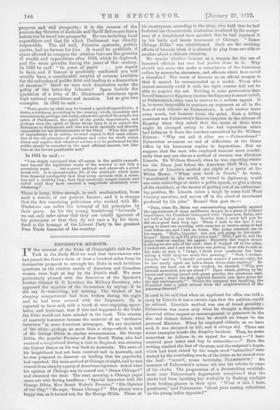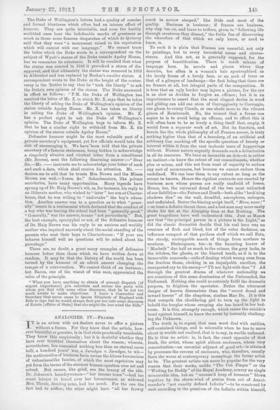DEFENSIVE RUMOUR.
IN the account of the Duke of Connaught's visit to New York in the Daily Mail we read that interviewers who had joined the Duke's train at least a hundred miles from its destination prepared to entangle the Duke in such invidious questions as the relative merits of American and Canadian women were kept at bay by the Duke's staff. We were particularly pleased with the discretion of the Speaker's brother Colonel H. C. Lowther, the Military Secretary, who appeased the appetite of the tormentors by saying—if he did say it—something, yet nothing. The window of his sleeping compartment bad been broken during the night and he had been covered with the fragments. He is reported to have said, with a touch at once engaging, specu- lative, and irrelevant, that if this bad happened to the Duke the Duke would not have minded in the least. This evasion of masterly innocence became the material of an "exclusive interview "in some American newspaper. We are reminded of the story—perhaps no more than a story—which is told of Sir George Dibbs in similar circumstances. Sir George Dibbs, the popular Premier of New South Wales, who had received a knighthood during a visit to England, was crossing the United States on his way back to Australia. The news of his knighthood had not been received well in Australia, and he was prepared to discover on landing that his popularity had vanished. His train arrived at Chicago at night, and he was roused from sleep by aparty of American reporters. Asked what his opinion of Chicago was be roared out, "Damn Chicago !"
and slammed the door. The next morning a Chicago paper came out with flaring headlines : "Special Interview with Sir George Dibbs, New South Wales's Premier," "His Opinion of our City," "He says, 'Damn Chicago l" The phrase was a happy one, as it turned out, for Sir George Dibbs. Those of his countrymen, according to the story, who held that he had forfeited his characteristic Australian manhood by the accept- ance of a knighthood were satisfied that lie had regained it by his burly and heroic treatment of Chicago. " Damn Chicago Dibbs " was rehabilitated. Such are the soothing effects of humour when it is allowed to play from one side or another about a delicate situation.
We wonder whether humour as a weapon for the use of harassed officials has ever had justice done to it. Why should not some one make a compilation of the humorous sallies by monarchs, statesmen, and officials which have saved a situation P The worst of humour as an official weapon is that it cannot be recommended as a model. Those who cannot naturally wield it with the right tiv,ance will not be able to acquire the art. Nothing is more provocative than forced humour or flippancy (unless the flippancy is meant to kill,
as Palmerston's often was) in answer to a serious appeal. It is, however, impossible to continue an argument at all in the
face of such ridicule as Palmerston's. A soft answer turns away wrath, but humour turns the point.. Such a killing comment was Palmerston's famous response to the citizens of Rugeley when they asked that the name of their town might be changed owing to the bad reputation which had fallen on it from the murders committed by Dr. William Palmer : "Why not call it after me — Palmerstown P" Palmerston overcame no end of difficulties at the Home Office by his humorous replies to deputations. But we suppose that the man who employed humour more consist- ently than any one else as a method of evasion was Abraham Lincoln. Sir William Ruseell, when he was reporting events for the Times just before the American Civil War, was rt. witness of Lincoln's method one night at a party at the White House. "When men bred in Courts," he wrote, "accustomed to the world, or versed in diplomacy, would use some subterfuge or make a polite speech, or give a shrug of the shoulders, as the means of getting out of an embarrass-
ing position, Mr. Lincoln raises a laugh by some bold West Country anecdote, and moves off in the cloud of merriment produced by his joke." Russell then goes on :—
"Thus, when Mr. Bates was remonstrating apparently against tho appointment of some indifferent lawyer to a place of judicial importance, the President interposed with, 'Come now, Bates, he's not half as bad as you think. Besides that, I must toll you ho did me a, good turn long ago. When I took to the law, I was going to court one morning, with some ten or twelve miles of bad road before me, and I had no horse. The judge overtook me in his wagon. " Hello, Lincoln! Are you not going to the court- house P Come in and I'll give you a seat." Well,! got in, and tho judge went on reading his papers. Presently the wagon struck a stump on one side of the road.; then it hopped off to the other. I looked out, and I saw the driver was jerking from side to side in his seat; so says I, "Judge, I think your coachman has been taking a little drop too much this morning." " Well, I declare, Lincoln," said he, "I should not much wonder if you are right, for he has nearly upset me half-a-dozen times since starting." So putting his head out of the window, he shouted, " Why, you infernal scoundrel, you are drunk I" Upon which, pulling up his horses and turning round with great gravity, the coachman said, "By gorra I that's the first rightful decision you have given for the last twelvemonth."' Whilst the company was laughing, the President beat a quiet retreat from the neighbourhood of the Attorney-General."
It used to be said that when an applicant for office was told a. story by Lincoln it was a certain sign that the petition would be refused. Lincoln's method was one of broad geniality ; Palmerston was suave only when he thought a deputation deserved either respect or encouragement to persevere in the dim and distant future when he should no longer be the
pestered Minister. When he employed ridicule, as we have said, it was designed to kill, and it always did. There are many examples beside the Rugeley incident. Thus, he wrote somewhat as follows to an appeal for money :—"I have received your letter and beg to subsetibe---." Here the writing reached the foot of the page, and the recipient's hopes, which bad been raised by the magic word " subscribe," were dashed by the concluding words of the letter as ho turned over the leaf : "myself, yours faithfully, PaLmensmox." An instance of Palmerston's urbane wit was his rebuke to some of his clerks. The proprietress of a dressmaking establish- ment near Palmerston's department complained that the clerks had been insulting her workgirls by flashing sunlight from looking-glasses in their eyes. "What is this I hear, gentlemen," said Palmerston, "about your casting reflections on the young ladies opposite ?" The Duke of Wellington's letters had a quality of concise and formal bluntness which often had an intense effect of humour. They are quite inimitable, and even the hastily scribbled ones bear the indefinable marks of greatness as much as those more famous despatches of which de Quincey said that they were " a monument raised to his reputation which will coexist with our language." We cannot trace the letter which the Duke wrote to a correspondent on the subject of Wyatt's statue of the Duke outside Apsley House, but we remember its substance. It will be recalled that when the statue was erected in 1846 it provoked a storm of dis- approval, and that ultimately the statue was removed in 1883 to Aldershot and was replaced by Boehm's smaller statue. A correspondent wrote to the Duke at the height of the contro- versy in the 'forties to say that be "took the liberty" to ask the Duke's own opinion of the statue. The Duke answered in effect as follows : "P.M. the Duke of Wellington has received the letter of Mr. X. in which Mr. X. says that he takes the liberty of asking the Duke of Wellington's opinion of the statue outside Apeley House. Mr. X. has taken no liberty in asking the Duke of Wellington's opinion. Mr. X. has a perfect right to ask the Duke of Wellington's opinion. The Duke of Wellington begs to inform Mr. X. that he has a similar right to withhold from Mr. X. his opinion of the statue outside Apsley House."
Defensive humour might be the most valuable part of a private secretary's equipment, yet few officials would take the risk of encouraging it. We have.been told that the private secretary of a famous statesman, being bidden to acknowledge a singularly abusive and virulent letter from a constituent (Mr. Brown), sent the following disarming answer :—" Dear Sir,—Mr. instructs me to acknowledge your letter of such and such a date, which shall receive his attention. Mr. — desires me to add that he trusts Mrs. Brown and the Misses Brown are well.—lours, Sze?' Schoolmasters, like private secretaries, have many opportunities. Many legends have sprung up of Dr. Haig Brown's wit, as, for instance, his reply to an illiterate mother, who wished to " inter " her son at Charter- house, that he was willing to " undertake " the boy's educa- tion. Another answer was to a question as to what "gener- ally" meant in a testimonial which declared that the conduct of a boy who was leaving the school had been "generally good." "Generally," was the answer, means "not particularly." But, the best example, apocryphal or not, of the defensive humour of Dr. Haig Brown was his reply to an anxious and worldly mother who inquired narrowly about the social standing of the parents who sent their boys to Charterhouse "If your son behaves himself well no questions will be asked about his parentage."
There are, no doubt, a great many examples of defensive humour better than those which we have written down at random. It may be that the history of the world has been turned by the humour of an adroit answer changing the temper of a conversation. We cannot think of an instance ; but Bacon, one of the wisest of wise men, appreciated the value of the principle.
"When you have anything to obtain of present dispatch [of urgent importance] you entertain and amuse the party with whom you deal with some other discourse, that he he not too much awake to make objections. I knew a Counsellor and Secretary that never came to Queen Elizabeth of England with Bills to sign but he would always first put her into some discourse of Estate [affairs of State] that she might the less mind the Bills."























































 Previous page
Previous page